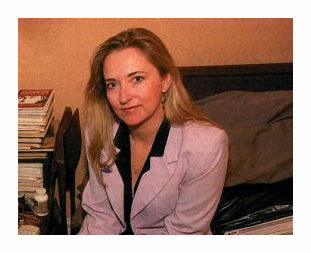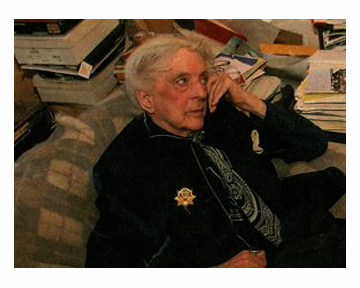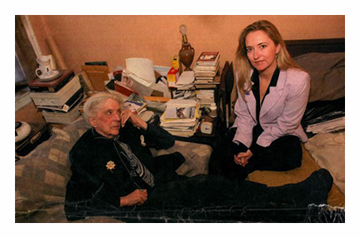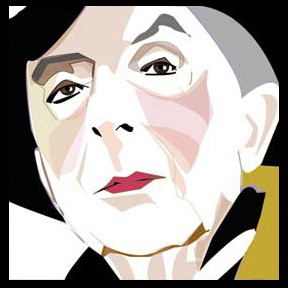|
A CENTENNIAL CELEBRATION! |
|
 |
THE QUENTIN CRISP ARCHIVES
MICHÈLE GOYCOOLEA CRAWFORD
Quentin's great-niece
 Now that Quentin’s 100th birthday approaches, it gives us an opportunity to revisit his legacy. As his great-niece, I hope I can add something to flesh out his popular image, as well as take personal stock of what impact his life has had and continues to have on our family. Now that Quentin’s 100th birthday approaches, it gives us an opportunity to revisit his legacy. As his great-niece, I hope I can add something to flesh out his popular image, as well as take personal stock of what impact his life has had and continues to have on our family.I met Quentin, or Uncle Denis, when I was a baby. Of that meeting, he wrote to my Aunt Denise (his namesake), “The child—my great-niece—who was pale blue, is now pink and as fat as a pig. I presume this is a good sign.” However I do not recall this meeting as shortly after we moved from London to Chile. It was many years later, when our family converged to the United States in 1980, and Quentin was doing the same, that I met him again. At that age one longs to stand out from the crowd and having Quentin Crisp as your great-uncle was a very cool thing indeed so I was looking forward to meeting him very much. He was always a great source of pride to our family but I am not sure if he ever became aware of it. We were of a new generation and his lifestyle was not scandalous to us as it must have been to his father whom I always was told was a rather dull man. I think he took after his mother whom he looks a lot like. She was beautiful, exciting and funny. There are home movies of her in bed, surrounded by cats and Quentin prancing about barefoot, with dark glasses in the background. He must have been in his early forties. My mother was there, eighteen at the time and she often tells us of that pilgrimage to England from Chile, to see her grandmother before she died. “Baba”, as she was nicknamed, was run over by her own daughter as she backed out of her drive and ended up bedridden, but it was never treated as a tragedy because they were all so stoic and so eccentric. Quentin’s siblings were Gerald, Lewis, and Phyllis. Gerald had a more tragic and obscure life. I have no sense of what he was like but I was told he went to Asia, married someone who left him, then came back to England, drank himself under the table and disappeared. But my grandfather Lewis was extremely handsome and very funny and often went to work in his bedroom slippers. His was beloved for his grace and his wit and though he led a traditional life he was anything but conventional. And then there was Phyllis. When Quentin spoke of his family, which was rare, he spoke most fondly of his sister. Her innocence and lack of irony was legendary. I heard a story time and time again about Aunty Phil which now I sometimes think is more of a family myth: She was married to a Parson, Uncle John and one day she went to the doctor to see why she could not conceive. After her examination the doctor took Uncle John aside and informed him that the reason she could not conceive is that she was still a virgin, to whom Uncle John supposedly responded, “I know doctor—I didn’t have the heart to tell her…” Whether that story is in fact true or not, it is very consistent with my impressions of Aunty Phil. She always took you at your word and at face value. She was incapable of being judgmental and for those reasons among others I think Quentin loved her very much.  After we moved to The States, I began my relationship with Quentin. Though he often signed his letters “Uncle Denis” he was undoubtedly always Quentin Crisp while I knew him. Of me he once told the London Times, “Mrs. Crawford lives in what I call Doris Day County—picket fences and clipped lawns. I think she is a sophisticated woman in an unsophisticated setting. She accepts my lifestyle—she’s been to art school so at least that opens the door for eccentricity. She is very nice looking and her husband is nice looking. They are both what my mother would call presentable.” Adding later, “She wrote to me recently to tell me that as all the male relatives were dead, I was now the patriarch of the family. I took the news calmly. I am the closest to Mrs. Crawford because she lives so near. I feel unguarded when I’m with her. I never call her wanting something or just to see how she is. I don’t call anyone to see how they are—that is why my phone bill is so small. She seems very nice and good-hearted but I try not to be a burden. I am astonished at how detached I am. I’ve never thought about it before. I don’t confide in anybody. I can’t imagine ever beginning a sentence with 'I haven’t told anyone this but…' I need people, but I don’t need family or a specific person. I’ve distributed my love over the whole human race and it is now threadbare.”
After we moved to The States, I began my relationship with Quentin. Though he often signed his letters “Uncle Denis” he was undoubtedly always Quentin Crisp while I knew him. Of me he once told the London Times, “Mrs. Crawford lives in what I call Doris Day County—picket fences and clipped lawns. I think she is a sophisticated woman in an unsophisticated setting. She accepts my lifestyle—she’s been to art school so at least that opens the door for eccentricity. She is very nice looking and her husband is nice looking. They are both what my mother would call presentable.” Adding later, “She wrote to me recently to tell me that as all the male relatives were dead, I was now the patriarch of the family. I took the news calmly. I am the closest to Mrs. Crawford because she lives so near. I feel unguarded when I’m with her. I never call her wanting something or just to see how she is. I don’t call anyone to see how they are—that is why my phone bill is so small. She seems very nice and good-hearted but I try not to be a burden. I am astonished at how detached I am. I’ve never thought about it before. I don’t confide in anybody. I can’t imagine ever beginning a sentence with 'I haven’t told anyone this but…' I need people, but I don’t need family or a specific person. I’ve distributed my love over the whole human race and it is now threadbare.”Early on as I got to know him during my trips from Doris Day County to the city, or when we would bring him home to us sending all the neighbors curtains a-twitching, I realized he would never let down guard completely. But I think he felt cozy, he would take of his shoes, have a glass of Chivas Regal and eat anything you put in front of him. We would press him for glamorous stories and he always obliged holding court with stories of his life. We often met at the Copper Square Diner by his house as well. After, I would offer to get him a few staples and carry them up the stairs. He always accepted and I would get him canned soups, beer, and other non-perishables and help bring them upstairs to his legendary apartment. It was all that one would expect from the stories. I remember wondering if he ever changed the sheets of the bed, that was, nonetheless, very well made; did he just sleep on top of the covers, in full make-up leaving his appearance as undisturbed as possible? Or did he strip himself down every night, and put it all back together in the morning? I never dared ask. Quentin was present at all the important events of my adult life. At my wedding, all dressed up—the scarf, the fedora, make-up and blue hair, he definitely overshadowed the bride. He attended all our children’s Christenings too and when I sent him photos of my youngest child whom we named Ian Quentin he wrote back saying, “Thank you, dear Mrs. Crawford, for the delightful photographs of the new, improved Quentin. If they need a caption, it might be ‘Inherit my name but not my reputation.’ ” His letters were full of his well-crafted witticisms but also funny mundane insights into his life such as when he wrote, “My landlord has given me a refrigerator which now has to be defrosted—a ritual of which I have no experience whatsoever. It may prove to be a life work.”  Over the years I have often reflected on what Quentin’s legacy means historically. As to what he means to our family that is much easier to understand. He has broadened my life immensely. The fact that his greatest accomplishments came after he reached the ripe age of sixty, is a constant inspiration to me. His dedication to living authentically is also really outstanding. Of all the philosophers who’s lives I have read about, I don’t know anyone who lived what he preached as much as he did. He really walked the talk, as they say. Publicly I think he is sometimes mischaracterized as narcissistic and glib, as was recently done by a New York Times reviewer, but that is a shallow understanding. As with any radical, and Quentin was a radical, contradictions and paradoxes always emerge. You can’t flip a coin without defining that there is another side to the same. His individualism did border on narcissism but it was also an elevated form of protest against what was a tyrannical experience of intolerance in his youth. His loneliness as a child is almost unimaginable and I think it is why he often told me to “Love the unlovable”. After all, it is easy to love the lovable he would explain. With all his prickly contradictions he was really very sweet on the inside. You would never doubt it if you heard him laugh his warm chuckle that seemed to come from a really cozy little cottage or a warm cup of tea. To me he was and continues to be extremely lovable. Over the years I have often reflected on what Quentin’s legacy means historically. As to what he means to our family that is much easier to understand. He has broadened my life immensely. The fact that his greatest accomplishments came after he reached the ripe age of sixty, is a constant inspiration to me. His dedication to living authentically is also really outstanding. Of all the philosophers who’s lives I have read about, I don’t know anyone who lived what he preached as much as he did. He really walked the talk, as they say. Publicly I think he is sometimes mischaracterized as narcissistic and glib, as was recently done by a New York Times reviewer, but that is a shallow understanding. As with any radical, and Quentin was a radical, contradictions and paradoxes always emerge. You can’t flip a coin without defining that there is another side to the same. His individualism did border on narcissism but it was also an elevated form of protest against what was a tyrannical experience of intolerance in his youth. His loneliness as a child is almost unimaginable and I think it is why he often told me to “Love the unlovable”. After all, it is easy to love the lovable he would explain. With all his prickly contradictions he was really very sweet on the inside. You would never doubt it if you heard him laugh his warm chuckle that seemed to come from a really cozy little cottage or a warm cup of tea. To me he was and continues to be extremely lovable. |
|
Read what Michèle Goycoolea Crawford wrote for the tribute booklet An Evening for Quentin Crisp: The Memorial. < |

Site Copyright © 1999–2009 by the Quentin Crisp Archives.
All rights reserved.

